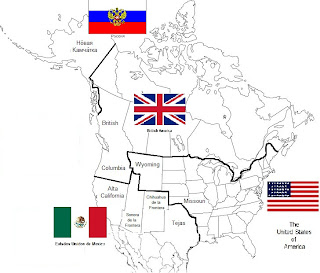Next entry in the alternate history series: Colonial Megafauna.
Added later: information about why the border between post-Mexican-War Mexico ended up where it did, and what an alternate "lesser" Mexico would have been like if the border had ended up even further south - and what the American Civil War might have been like if Sonora, Coahuila, and Chihuahua had been absorbed and admitted as states.
We're fortunate that today the land border between the U.S. and Canada is the longest undefended border on the planet. But there was an actual U.S. invasion plan for Canada for the 1920s and 30s, in anticipation of U.S. and U.K. interests' running afoul. (H/T Luke Muehlhauser.)
[Added later: guest-blogging at the Daily Dish, Alex Massie shares my rather pessimistic view of American military's chances against the British in the first half of the nineteenth century, specifically discussing the War of 1812.]
Keeping in the military mindset of the previous century, the U.S. planned to capitalize on its proximity and its access to the interior of the continent. The same considerations were likely what brought a reasonable end to the War of 1812. The British knew the U.S. couldn't match them on the seas, and demonstrated this by burning selected targets in Washington after sailing right up the Potomac, in retaliation for the American burning of Toronto. But they also knew that a military campaign to conquer the American interior was hopeless, and this is what the later War Plan Red capitalized on. Of course, fortunately (in the most perverse possible sense) World War II occurred and stopped a second War of 1812, and suddenly the idea of invading Canada – or the idea of worrying about British troops more than Japanese troops – seemed absurd. Britain was fighting for its life and there were friends of Britain's enemies bombing American territories.
There are actually several interesting but terrible ways that the U.S.-Canadian (and –British) relationship could have turned out much worse than it did as a result of war. The first is the possibility of a nineteenth century Canadian war. Immediately following the War of 1812 some admirably cool heads prevailed in London and Washington, and an agreement was made to co-develop the Pacific Northwest. (You will look a long time in world history for agreements between competing powers as rational as this one.) Then of course came the end of the agreement, with the 1845 slogan "54'40" or fight". (54'40" is the southern border of the Alaska panhandle. The U.S. was essentially demanding all of BC, and the southern half of the prairie provinces to boot.) Had this led to war, it is very likely that it would've meant a sound naval defeat for the U.S. that had major territorial implications, since most settlement and trade in the Oregon Country at that point moved by river. Oregon Country was far enough from Washington that it would effectively have been a foreign war for both countries along the coast and rivers; in those circumstances you'd be a fool to bet against the nineteenth century British Navy. A worst case scenario would have meant the Americans losing the entire Oregon Territory, all the way back to what are today the American northern Rockies. The U.S. would certainly not have held the coast, and would not have held the Columbia. (Don't even try to tell me they could have held the Fraser.) As a result the northern Rockies could well have become an international boundary, just like the Andes on the other American continent. Yellowstone would have been on a hostile tripartite border.

Also keep in mind that, in actual history, the U.S. was scheduled to fight Mexico the following year, gaining such familiar territories as California and Texas. With a military demoralized and battered by the British, and likely a new administration elected that was far less interested in expansion, it's hard to argue we would have started the Mexican War when we did, or at the very least had fewer gains. Our border with Mexico after the earlier Florida purchase was the Arkansas River, which cuts through Oklahoma, Kansas and Colorado, so substantial chunks of the southwestern Midwest would also not have been gained. It's also less much less likely under these circumstances that the Alaska purchase would have occurred; it almost didn't as it was. Sadly New Kamchatka would not have been able to produce beloved governors and Vice Presidential nominees for the far-away American capital. Consequently, Going to war over 54'50" could very likely have meant the U.S. lost its entire Pacific Coast. Worst case scenario map below, with international boundaries darkened and changed sub-national territories named.
In alternative histories, the best-known rendering of a U.S.-Canadian war was in Harry Turtledove's Southern Victory series, where in 1914 the Confederacy allies with England and the Allies, and the North comes in with Germany and the Central powers. The Central powers win, the U.S. pushes the U.K. completely out of Canada, and sets up an independent Quebec as a client state.
As an aside, my favorite part of the War Plan Red article: "The best practicable route to Vancouver is via Route 99." I hope no one got paid for that. That's not war planning, that's buying a map at a gas station. Or being a Seattle commuter.
Previous entry:
The alternate vs. actual history test
Next entry: Lewis and Clark vs. the Sabretooth
No comments:
Post a Comment